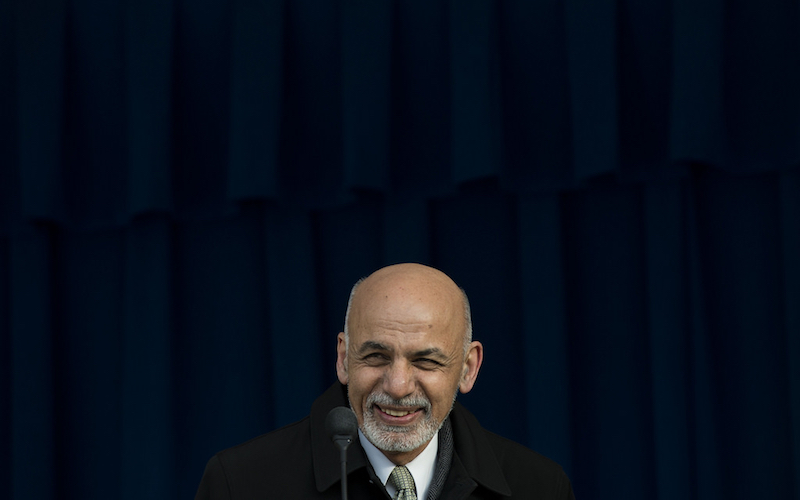
U.S Skips Afghan-Taliban Conference in Moscow
The conference on Afghanistan brought together 12 countries including Afghanistan, Russia, India, China, Pakistan, Iran, and the Central Asian countries. Chinese Special Envoy to Afghanistan, Zeng Zi Jun, represented Beijing at the meeting. However, representatives of western countries and the United Nations did not attend the meetings. The United States also declined to attend because it was not consulted with in advance. The meetings came after the United States dropped the mother of all bombs (MOAB) on Islamic State targets in Afghanistan. One of the bombs was the largest non-nuclear bomb ever used in combat that killed 36 ISIL militants.
The Afghanistan conference in Moscow, was organized by Russia to explore peaceful solutions to the turmoil in Afghanistan. According to the Russian Foreign Ministry, “The participants pointed out that there is no military solution to the Afghan crisis and that it can only be settled through the restoration of national accord by political means, in keeping with UN Security Council resolutions.” All the nations who participated in the talks have agreed on more cooperation towards fighting terrorism and taking political steps to protecting the Afghan people as well as the region.
The meetings also called on the Taliban to hold negotiations with Kabul. The Russian Foreign Ministry also “issued an appeal to the Taliban to abandon the use of force to resolve the internal Afghan conflict and to launch a direct dialogue with the government to work towards national reconciliation.” In addition, the parties at the meetings “expressed a shared concern over the growing terrorist activity in the country, which is increasing the bloodshed and compounding the suffering of the people of Afghanistan.” The participants emphasized that the crisis in Afghanistan can only be solved through a political settlement.
Thanks, but No Thanks
The United States decided to skip the Afghanistan talks in Moscow because of spiraling relations after the U.S attack on a Syrian air base used by the Russians to support President Assad. Afghanistan proves to be yet, another area of geopolitical competition between Washington and Moscow. In addition, Washington does not want to see Moscow play a leading role in the region because the U.S led Quadrilateral Coordination Group (QCG), which includes the United States, China, Afghanistan, and Pakistan, failed to bring the Taliban to negotiations because there was no willingness from the Taliban to come to the negotiating table.
The Trump administration’s decision not to attend this conference will leave another hole in U.S.-Russia relations and it seems quite unclear what the agenda for U.S. policy in Afghanistan is going forward. At a State Department briefing, Spokesman Mark Toner stated that the U.S. did not attend because the meetings “seemed to be a unilateral Russian attempt to assert influence in the region that we felt wasn’t constructive at this time.” Toner later said that “we [the United States] do plan to work with Russia and other key regional stakeholders to enhance dialogue between the Afghan government and the Taliban.” Toner’s remarks sound very confusing and it simply makes no sense. Why would the United States back out of a peaceful dialogue on the stability of Afghanistan when all of the other stakeholders took part in the discussions?
The United States should play a crucial role for the security of Afghanistan and enhance dialogue for the future. But, the recent MOAB action taken by the U.S. military has left critics thinking that this bombing in Afghanistan diminishes the likelihood for more negotiations between the U.S. and its partners in the region. The United States dropped a massive Ordinance Air Blast (MOAB) on “a huge cave complex in the Tora Bora mountains of Nangarhar province.”
The timing of this event came in the wake of Moscow hosting a third round of negotiations to propose a supporting peace process where officials from 12 nations decided to engage in a heavy dialogue for the future of Afghanistan. The United States is concerned about this conference for many reasons. First, Russia’s rapprochement with Pakistan has sparked concerns for the selling of weapons to armed militant groups. That remains uncertain. Second, Russia’s ability to play a more active role has been seen as suspicious from Washington and all the speculation of military supplies, as well as contacts with the Taliban have the Trump administration on their heels. The attendance of senior Afghan officials in Moscow shows that Afghanistan will not back away from Russia’s presence in the region and if there is a path for peace in Afghanistan, the pressure is on the Taliban to have the willingness to come to the table and participate for a lasting peace. Given the current geopolitical environment in the region, there is still a long way to go for this to happen.
Reactions to the MOAB Campaign
So far, the Trump administration does not have a coherent plan for the U.S. role for a stable Afghanistan. Most of the issues that were discussed during the meetings in Moscow included reconstruction efforts, increasing regional cooperation, and ramping up the process for a peaceful settlement. If the United States and other western nations had come to the negotiating table in Moscow, the meetings would have been a major breakthrough for a peaceful solution for the future of Afghanistan. It may not be the final solution, but the meetings could have led to more common-ground negotiations for a final settlement.
The MOAB bombing initiative from the Trump administration sent a message to some of the players in the region such as Russia, Pakistan, Iran, and China that a U.S. presence in the region will continue and it also showed off America’s strength in an ever-growing geopolitical environment in South Asia. However, questions still need to be answered. What did this action accomplish? What does Washington gain from this campaign? And what U.S. interests are at stake in Afghanistan? These are the hard questions that need to be asked in Congress. Attiqullah Amarkhail, a Kabul-based retired military general told Deutsche Welle that “the US military did not need to use such a huge bomb to target a small number of IS fighters.” Amarkhail added, “When you drop 11 tons of explosives and kill only 36 of your enemies, it is a waste of your weaponry, unless you have some other targets to achieve.”
What does the MOAB initiative mean for the Moscow conference? Well, the ever-changing atmosphere has seen some dramatic shifts in relations. Former Cold War rivals, India and the United States, are working together on the defensive front, and they are working closer than ever before. On the other hand, the U.S. and Pakistan are drifting away from each other and Pakistan’s closer ties with Beijing have raised some eyebrows in Washington. Many experts in Washington also argue that the MOAB campaign was a response to Russia and China that the United States is going to stay in Afghanistan and it simply will not tolerate a Russian and Chinese presence in the region which is a problem since Afghanistan is in both Russia and China’s backyards. Many critics see the MOAB campaign as a military action that will only exacerbate the security situation and increase the capabilities of the terrorists. So, the security concerns are still a long way from being resolved later.
Russia’s Backyard?
There are many objectives for Russian influence in Afghanistan. First, maintain a stable-friendly Afghanistan that can maintain close ties with the Russian Federation and former Soviet Republics. Second, Russia has shown some concerns for narcotics drug trafficking in Afghanistan, especially since Afghanistan is the largest producer of heroin in the world. According to Amin Saikal, a distinguished professor of political science at the Australian National University, Afghanistan accounts for “20 percent of the $70bn opiate market, with around 1.8 million injecting drug users in 2015. Around 90,000 Russians die from drug overdose, including heroin, every year.” Lastly, Russia wants to expand its influence in Afghanistan given the fact that Afghanistan is geographically located on the borders of the former Soviet Republics such as Tajikistan, Turkmenistan, and Uzbekistan, Russia has security interests to blocking the flow of drugs and terrorism coming in from Afghanistan and Central Asia.
The inability of NATO and the United States to maintain peace and stability in Afghanistan has created a vacuum for a Russian influence in the region. Amin Saikal, writing in Al Jazeera, suggests, “The US drawdown, without Washington achieving its original goal of transforming Afghanistan into an effectively viable and secure state, has opened an important arena for competition between different regional powers, leading to claims of a new ‘great game’ between Russia and the US.” Moscow has always taken a hostile stance towards Wahhabism. There is also a concern of an ISIL presence in Afghanistan, but there is also a growing insurgence in Uzbekistan with the growing influence of the Islamic Movement of Uzbekistan (IMU).
Economically, Russia has mostly been involved in infrastructure projects and trade in Afghanistan. Russian enterprises have contributed to housing, factory, and construction projects in areas that had been destroyed by the Taliban. In addition, Russo-Afghan trade ties between 2010 and 2013 have increased dramatically and so far, this trend continues to increase. In addition, “by 2014, Russia was Afghanistan’s fifth-largest export and sixth-biggest import market, involving over 140 construction projects, mostly restoring Soviet-era housing complexes, facilities and factories and improving infrastructure.”
Russia’s military involvement in Afghanistan and Central Asia has focused mainly on security. Russia has forces on the Tajikistan-Afghanistan border and they have established military bases in Central Asian countries that border Afghanistan. Moscow has also been involved in selling M-17 helicopters to the Afghan army and both Moscow and Kabul are presently negotiating on the sales of MI-35 helicopters and AK-47 automatic rifles. However, these ties are constrained due to Washington’s anger towards Moscow’s influence in the region. Even though Russia cannot compete militarily or economically with the United States, Moscow still has plenty to gain in Afghanistan. It is an important location for reducing the flow of heroin going into and out of Central Asia and the Russian Federation, Afghanistan is a security concern for the growing influence of Taliban and ISIL fighters, and thus Moscow maintains its close ties with Kabul and the other Former Soviet Republics. Because of these implications, Russia can benefit from a peaceful and stable Afghanistan.
Trump’s Afghanistan Gamble
The United States finds itself in a very sticky position in Afghanistan. The growing Russia, Pakistan, and China influence in the region has raised some concerns in Washington. If the situation is handled improperly, this region could explode into a time bomb. After the MOAB bomb was dropped on Afghanistan, the Trump administration has warned Pakistan, China, and Russia to stop funding the Taliban. However, the War in Afghanistan has been going on for 16 years which is the longest ongoing conflict in American history. National Security Advisor H.R McMaster met with Afghan leaders and he has assured them that the United States will play “a productive role, a positive role and to help the Afghan people rather than to try to perpetuate this very long conflict.” The only way Washington and the other actors can play a role in Afghanistan is through a political solution. A military solution will only exacerbate security concerns, and negotiations should continue until there is a final settlement that is recognized by the global community and the Afghan people.

